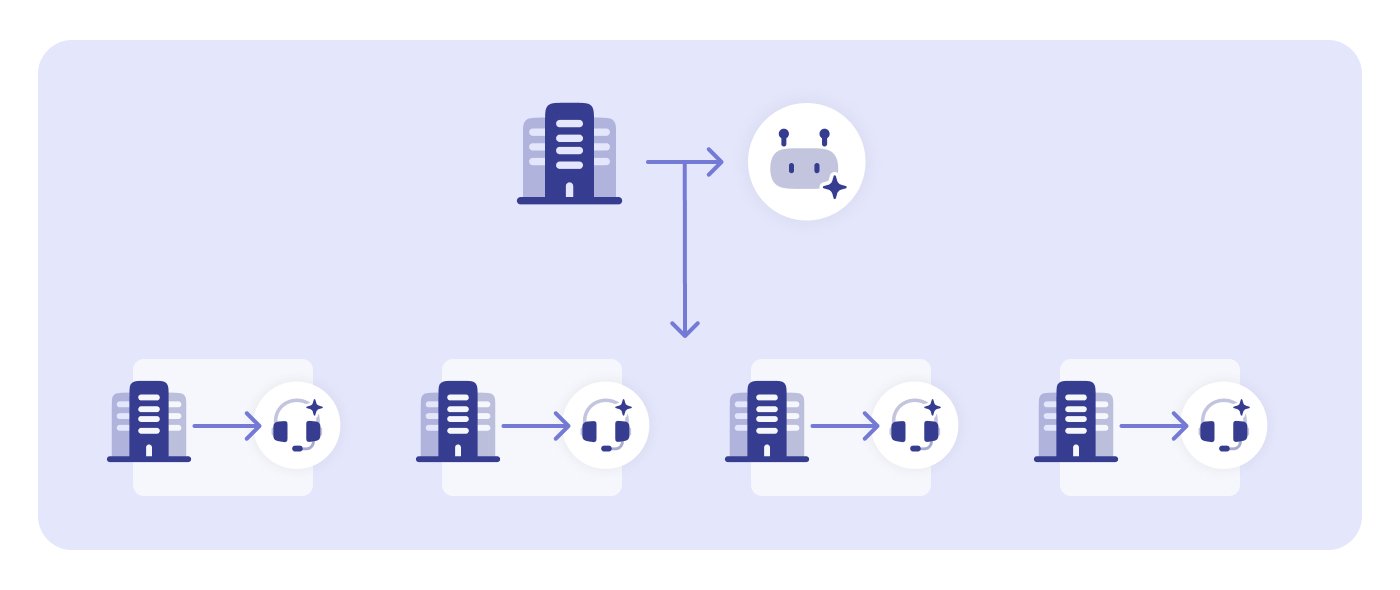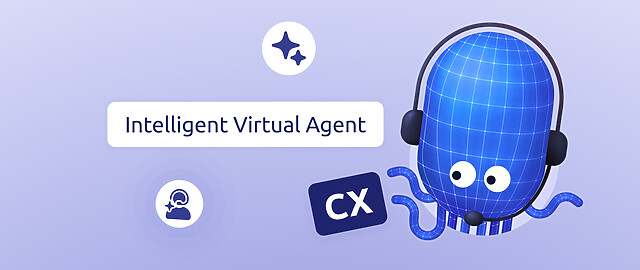What Is an Intelligent Virtual Agent?
Unlike traditional bots or IVRs that follow rigid scripts, an intelligent virtual agent (IVA) is designed to combine automation, adaptability, and advanced language understanding within a fluid, conversational experience. It utilizes AI—specifically, natural language processing and generative models—to handle complex requests, even when phrased ambiguously or imprecisely.
Deployed across multiple customer touchpoints (voice, chat, messaging platforms), IVAs operate within omnichannel environments and support a wide variety of use cases. Crucially, they don’t just execute tasks—they become an integrated part of the customer journey, interfacing with CRM systems, knowledge bases, and business tools.
Rather than being a fixed solution, an IVA is a dynamic technology that learns from every interaction, aligns with business goals, and ensures continuity of service at scale.
How it works: from understanding to personalization
Intelligent virtual agents are powered by natural language processing (NLP), which enables them to understand even ambiguous or complex queries. Beyond just interpreting words, they detect intent and context, with real time data processing to tailor each interaction. This advanced capability places them far ahead of basic voicebots in terms of usefulness and user experience.
Increase Customer Self-Service With AI Agents

AI will revolutionize self-service channels
One of the most tangible benefits of an intelligent virtual agent is how it empowers customers to resolve issues independently. Tasks such as updating a shipping address, tracking an order, reporting a technical issue, or accessing billing info can all be completed without speaking to a live agent.
AI agents are now highly effective at identifying the most probable solutions based on given inputs. Advances in machine learning and natural language processing have enabled more successful interactions between AI and customers. By synchronizing your conversational IVR with chat or voice-based self-service channels, the advanced capabilities of conversational AI can resolve simple queries and increase first-contact resolution (FCR) rates in record time.
This level of autonomy reduces friction, improves customer experience, and frees up human teams from repetitive tasks.
Real-world use across industries
In retail, customers can track their orders or process returns without needing to speak with a representative. In banking and insurance, they can view or update their personal details. In telecom, they can reset passwords or troubleshoot connectivity issues. These interactions are handled seamlessly by intelligent virtual agents or other innovative self-service tools that leverage the latest in artificial intelligence technology to predict, take action, and adapt in real-time..
The enduring importance of personalization
Self-service becomes far more effective when it’s personalized. An intelligent virtual agent that can factor in the user’s profile, history, and preferences delivers more relevant responses, chooses the right channels, and adjusts its tone accordingly.
This level of personalization builds stronger brand loyalty and makes every interaction feel smoother and more human. The goal is to deliver a tailored, continuous, automated support to every customer for a personalized experience.
The Impact of Intelligent Virtual Agents
Establish clear metrics to measure success
It’s easy to track the ROI of implementing an intelligent virtual agent. Businesses typically see fewer inbound calls, higher first-contact resolution (FCR), lower abandonment rates, and stronger customer satisfaction scores. These are clear signs of both increased team efficiency and an improved customer journey.
A growing knowledge base that benefits the entire business
Every interaction with an intelligent virtual agent feeds into a dynamic knowledge base. It logs recurring questions, phrasing patterns, and effective replies—building a valuable source of insight for the whole organization.
By analyzing common requests and customer pain points, teams can refine internal processes, expand FAQs, and improve product strategy.
Brand consistency at every touchpoint
Maintaining a consistent brand voice is a major challenge in customer communication. Unlike human agents who may vary in tone or interpretation, intelligent virtual agents ensure a unified message—regardless of channel, time, or context.
That consistency, carefully designed and managed by the brand, becomes a powerful part of the customer experience.
The Coming Wave of Generative AI in Customer Service

Widespread enterprise adoption
The adoption of generative AI in customer self-service is accelerating fast. It’s no longer just a pilot project—it’s becoming a new standard. According to Gartner’s Customer Service AI study, “85% of customer service leaders plan to test or deploy a generative AI-powered conversational solution by 2025.”
A more natural experience for the customer
Intelligent virtual agents powered by generative AI offer a significant leap forward from traditional chatbots due to remarkable advancements in machine learning and predictive decision-making. This translates into higher customer satisfaction scores and a common perception that these AI interactions feel more like genuine conversations. With generative AI at the core of your intelligent agents, interactions become smoother, answers more nuanced, and the tone naturally adapts to each customer. Customers no longer feel as though they are interacting with a robot; instead, they feel heard and understood on a scale previously unimaginable.
This quality of exchange builds trust and gradually shifts customer habits toward innovative self-service solutions.
A surge in AI investments
AI is now a top priority for business leaders, with 80% of organizations telling McKinsey & Co that they plan to increase their AI and generative AI budgets within the next year. A mandate that high is rare and it indicates a significant strategic shift, not just a passing trend, that is expected to profoundly transform the customer experience industry. Some experts even suggest this transformation could be as impactful as the advent of the internet.. AI technologies are now recognized as key drivers of performance and competitive advantage.
The intelligent virtual agent is set to be a cornerstone in the initial adoption of generative AI and agentic solutions, driving the upcoming wave of AI business transformation. Automating personalized customer experience is an ideal application for agentic AI. Intelligent virtual agents are already proving their value by simultaneously reducing costs and enhancing the customer experience. Consumers are rapidly embracing generative AI tools, such as ChatGPT, to resolve issues and gain knowledge. Given these advantages and the clear preferences of both consumers and business leaders, the quality of experience businesses provide through self-service channels—where human agents will be more accessible for complex issues and personalized service—is poised to become a significant competitive differentiator in the very near future.
Use Cases by Industry
Customer service: automating routine requests
In customer support teams, intelligent virtual agents handle a wide range of everyday questions—such as tracking deliveries, updating personal information, or processing simple claims. This speeds up response times and reduces the workload on human agents.
Contact centers: streamlining inbound traffic
In contact centers, intelligent virtual agents can jump in as soon as a customer initiates a call or chat. They qualify the request, route it to the right department, or even resolve it directly if it falls within their capabilities. This approach relieves pressure on agents and improves the overall handling process.
Sales teams: supporting leads from first contact to conversion
On the sales side, intelligent virtual agents qualify leads, answer product-related questions, offer tailored recommendations, and guide prospects through the entire process, from booking a demo to completing a purchase. They integrate seamlessly into the digital sales journey by automating repetitive steps in the sales funnel.
Conclusion
The intelligent virtual agent is no longer just an automation tool—it’s a true engine of transformation. It streamlines workflows, empowers customers, and allows human teams to focus on high-value tasks. The results speak for themselves: greater operational efficiency and stronger customer relationships.
Powered by Diabolocom’s AI, these agents combine natural language understanding, real-time personalization, and seamless coordination between humans and machines. The outcome? Faster, more natural, and more satisfying experiences—across every channel.
In a world where customer expectations evolve as fast as technology, it’s no longer enough to simply keep up. To build long-term, high-impact customer relationships, companies need to anticipate change—and invest in the right tools today.
Streamline customer interactions with an intelligent virtual agent



